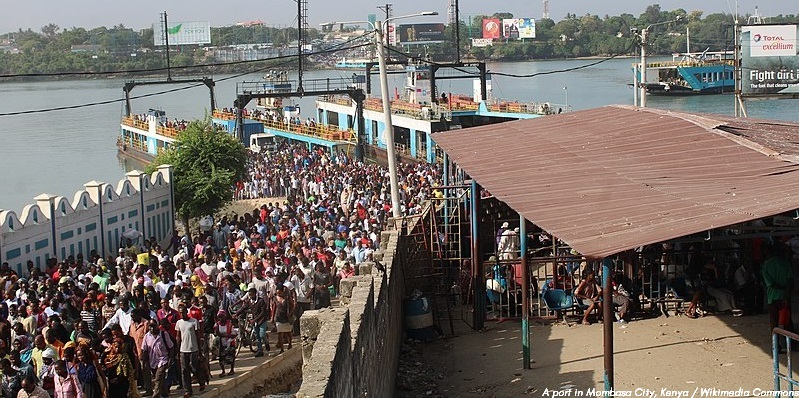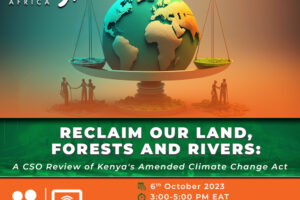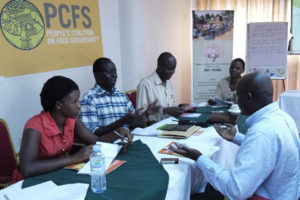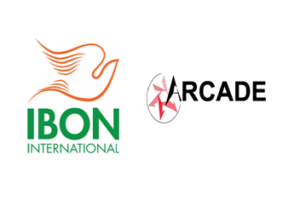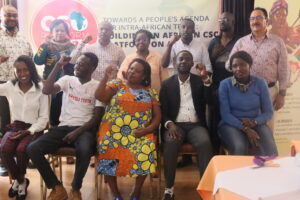Regional Dispatch – IBON Africa
1 April 2020
The Covid-19 contagion in Africa would require more international cooperation, as a spread of the virus in the region would later create risks of more contagion for the whole world.
As of March 23, 2020, there were already 1,326 confirmed cases of the 2019 Coronavirus disease (Covid-19) in Africa, with 43 out of 54 countries in the continent affected. Forty deaths due to the virus were also recorded, while 122 of the patients were said to have recovered. The recorded deaths from the virus were highest in Algeria, Egypt, South Africa, and Burkina Faso.[i] However, World Health Organisation (WHO) Regional Director for Africa Matshidiso Moeti said that the number of cases reported in the region might not be an accurate representation because testing is not robust.[ii] The first-ever recorded case in the continent was in Egypt on February 14, 2020. The country has the highest number of confirmed cases at present.[iii]
Overwhelmed healthcare systems
The capacity of African countries to handle critical cases remains a primary concern. Facilities and personnel were already scarce even before the virus outbreak. In Burkina Faso, for example, emergency teams are not trained for a respiratory disease outbreak. They also lack appropriate protective gear according to a government response plan seen by the Associated Press.[iv]
Officials are concerned that the rapid spread of the virus could also overwhelm the region’s struggling healthcare system. Africa accounts for 16% of the global population, but just 1% of healthcare spending.[v] There is little money for ventilators and other life-support equipment needed for severe cases of Covid-19, and any sustained fight against the coronavirus would steer resources away from malaria and HIV, which kill hundreds of thousands every year. Health experts have warned that even facilities in a country like South Africa, which has a robust health system, could still be overwhelmed by the spread of the virus.[vi] The country now has the second-highest number of confirmed cases of the coronavirus infection in the continent.
Closures, bans and lockdowns
As of writing, a complete travel ban has been imposed in nine countries: Tunisia, Libya, Egypt, Sudan, Ghana, Cameroon, Kenya, South Africa, and Uganda. Seven countries, Mali, Senegal, Morocco, Algeria, Nigeria, Tanzania, and Madagascar, are under a partial travel ban policy.[vii] Other countries are expected to adopt the same policies as the virus continues to spread within the continent. Many of these countries are likewise suspending public transport, shutting their borders, closing schools and universities, barring large public gatherings and moving towards a militarised lockdown of poor communities.
Rwandan officials have banned all unnecessary movements outside homes for two weeks as of March 22 except for essential services such as healthcare and shopping. All public and private employees have been told to work from home. Tunisia earlier imposed a lockdown as well.[viii]
On March 24, the President of Senegal declared a state of emergency in an attempt to stop the spread of the virus. A curfew has been imposed from 8pm to 6am. Most markets will be closed. Travels between regions will be restricted and in some cases banned. These measures are in addition to those already taken a few days ago such as the closure of schools and universities for three weeks, and the ban on large public and private gatherings.[ix]
Last March 16, President Nana Akufo-Addo of Ghana closed all schools and universities until further notice. The president also announced that all public events like conferences, religious services, sports matches, and political rallies will be suspended for the next four weeks.[x] On March 22, President Andry Rajoelina of Madagascar ordered lockdowns in two main cities to try to contain the spread of the coronavirus across the poverty-stricken Indian Ocean nation. Any transport, except for goods, was forbidden, he added. Only stores selling vital products such as food can open for business, and only one person per family can go shopping.[xi]
Zambia has also shut down all education institutions to prevent the outbreak of coronavirus. Church services in the Christian nation have been limited to one hour and the operation of bars has been limited to two hours a day. Restrictions on foreign travel have been imposed and two- to 14-day quarantine have been ordered for travelers coming from “high-risk” nations if asymptomatic. Lockdowns will be implemented if necessary.
Cooperation and solidarity would mean initiatives to send medical supplies and equipment to troubled countries, debt cancellations (instead of mere rescheduling and relief from this year’s payments), and international pressure for governments to steer away from repressive militarism towards health solutions and economic support for working classes and the poor.
Locking down the poor
Sub-Saharan Africa has high rates of poverty and self-employment. Leaving the home every day to earn a living is a necessity. Thus, locking down poor communities without provision for food and other necessities will result in massive starvation.[xii] At least 72% of residents of Nairobi, Kenya live in slums, where access to basic facilities and critical infrastructure is wanting. There is limited access to water for the required handwashing and other sanitation practices. According to the UNICEF, three out of every five people across the world do not have access to basic handwashing facilities.
In Kenyan urban poor communities, the supply of water is restricted to mostly once a week. Homes are close to each other, with washing areas and bathrooms shared among residents.[xiii] Such places have served as breeding grounds for different sicknesses even before Covid-19. Urban poor residents are also the last ones to be tested for Covid-19 given the limited number of testing kits and facilities at present. Locking down poor communities without the necessary provisions and facilities is a sure formula for an outbreak among urban poor populations.
Nairobi’s Directorate of Criminal Investigation also announced that any individual deemed “guilty” of passing on infectious diseases to others knowingly will be fined KES 30,000 (around USD 287), made to serve a 3-year prison sentence, or both penalties. Vendors were also told that sellers of any item that will infect others will be held liable, adding that it is their responsibility to ensure that all their wares were disinfected.[xiv] While being strict on small vendors, the government promised to institute a raft of measures to support bigger businesses during this time that the economy is hit hard by the Covid-19 pandemic. This kind of double standard policy has made social movements wary of the government actions amid the pandemic.
Rising repression violates people’s rights, increases risks of contagion
As governments themselves know that overstretched health systems would not be able to address the disease and the peoples’ needs, they have resorted to repressive, militarised measures. The situation has indeed become a pretext for government repression directed particularly against the poor.
Along with the imposition of lockdowns especially in poor communities are vague policies on punishments for people who supposedly violate government guidelines. In Kenya, for example, President Uhuru Kenyatta has vowed that the government will take the “severest action” against any individual who breaches guidelines given by the Ministry of Health concerning the Covid-19 pandemic. The warning came as police broke up gatherings and ordered all people found idling in Eldoret town on March 23 to disperse.[xv]
In the Kenyan port city of Mombasa, police fired teargas and assaulted ferry commuters who were trying to make it home two hours ahead of the curfew implementation. Due to the tear gas, citizens were forced to touch their faces thereby increasing contagion risks. After curfew hours, healthworkers also reported police intimidation.[xvi]
In the South African capital of Johannesburg, police fired rubber bullets and used whips in a working-class neighbourhood shopping for their needs in a supermarket, in the name of enforcing social distancing on just the second day of a lockdown. Citizens as a result were reported to have trampled on each other.[xvii]
Any additional financial assistance for the continent must not worsen its debt burden, must be in grants, and must be according to donors’ commitments on human rights and effective development.
Responding to the Covid-19 in Africa
Many activists thus believe that lockdowns and accompanying measuresare not really intended to safeguard the health of the people as many governments claim. It is actually meant to contain the poor and protect the elite, not only from the virus outbreak but from the possible chaos that will ensue due to the crisis. Rights organisations have already condemned such violent state repression as seen in Mombasa, Kenya. Social movements are also conscious that such measures are implemented not just to combat the disease, but also foreclose any possibility of people’s actions.
At the economic front, the Covid-19 pandemic points to the need to reverse decades of neoliberal privatisation of social services such as healthcare, in Africa as in other regions of the global South. Leaders from the continent are aware that,even today, access to basic healthcare is an “exception rather than the norm.”[xviii] Certain African leaders admit that debt servicing for many countries has already been higher than their annual health spending.[xix] Even before the pandemic, many African countries have been struggling to pay their foreign debts using foreign currency gained from exporting primary commodities. With today’s economic slowdown, they face even less foreign currency to pay debts, much less for health budgets.
The Covid-19 contagion in Africa would require more international cooperation, as a spread of the virus in the region would later create risks of more contagion for the whole world. Cooperation and solidarity would mean initiatives to send medical supplies and equipment to troubled countries, debt cancellations (instead of mere rescheduling and relief from this year’s payments), and international pressure for governments to steer away from repressive militarism towards health solutions and economic support for working classes and the poor. Any additional financial assistance for the continent must not worsen its debt burden, must be in grants, and must be according to donors’ commitments on human rights and effective development.
In the long run, international cooperation should create conditions and policy norms that ensure right to basic social services and working peoples’ rights. A possible trend of enhanced state surveillance even in the global South must be reversed. Instead, citizens and communities such as in Africa must be empowered to substantively lead the shaping of decisions that would affect them, from state policy on health measures and epidemic response to development for urban and rural poor communities. ###
***
[i] World Health Organization. 2020. Africa Dashboard. 23 March. https://www.afro.who.int/health-topics/coronavirus-covid-19.
[ii] World Health Organization. 2020. More than 15 countries in Africa report COVID-19 cases. 12 March, https://www.afro.who.int/news/more-15-countries-africa-report-covid-19-cases.
[iii] The East African. 2020. Coronavirus: African countries with confirmed cases. 12 March. https://www.theeastafrican.co.ke/scienceandhealth/Coronavirus-african-countries-with-confirmed-cases/3073694-5485328-c70rcg/index.html.
[iv] The Berkshire Eagle. 2020. Africa lockdowns begin as coronavirus cases above 1,000. 21 March. https://hosted.ap.org/berkshireeagle/article/da6ca5326ab2d3d81bd5d9b9ba4321ce/africas-cases-above-1000-presidents-defy-own-travel-bans
[v] Bloomberg. 2020. Africa’s Struggling Health Care Systems Brace for Corona virus. 12 March. https://www.bloomberg.com/news/articles/2020-03-11/africa-s-struggling-health-care-systems-brace-for-coronavirus.
[vi] Associated Press. 2020. Africa should ‘prepare for the worst’ with coronavirus, WHO says. 19 March. https://apnews.com/caa613fb8004d3cd2ecae13201d7b745
[vii] Al Jazeera. 2020. Coronavirus: Travel restrictions, border shutdowns by country. 23 March. https://www.aljazeera.com/news/2020/03/coronavirus-travel-restrictions-border-shutdowns-country-200318091505922.html
[viii] MSN News. 2020. Coronavirus: Rwanda imposes Africa’s first lockdown. 23 March. https://www.msn.com/en-za/news/africa/coronavirus-rwanda-imposes-africas-first-lockdown/ar-BB11xxRm?li=BBqfP3n.
[ix] Associated Press. 2020. Africa enters lockdown after spike in coronavirus cases across continent. 22 March. https://www.indiatoday.in/world/story/africa-enters-lockdown-after-spike-in-coronavirus-cases-across-continent-1658346-2020-03-22.
[x] Ibid.
[xi] ABC News. 2020. Africa lockdowns begin as coronavirus cases above 1,000. 22 March. https://abcnews.go.com/International/wireStory/africas-cases-1000-presidents-defy-travel-bans-69726032.
[xii] Daily Nation. 2020. Why total lockdown might prove a hard nut to crack. 22 March. https://mobile.nation.co.ke/news/Total-lockdown-might-prove-a-hard-nut-to-crack/1950946-5499912-13e2tc1/index.html.
[xiii] Ibid.
[xiv] Kenyans.Co.Ke. Govt Sets Steep Penalties for Spreading Covid-19. 23 March 2020, https://www.kenyans.co.ke/news/51143-govt-sets-steep-penalties-spreading-covid-19.
[xv]Ibid.
[xvi]Al Jazeera. 2020. Kenya police under fire over ‘excessive force’ as curfew begins. 28 March. https://www.aljazeera.com/news/2020/03/kenya-police-fire-excessive-force-curfew-begins-200328101357933.html
[xvii]Agence France Press. 2020. S.African police fire rubber bullets at shoppers during lockdown. 29 March. https://www.afp.com/en/news/15/safrican-police-fire-rubber-bullets-shoppers-during-lockdown-doc-1q880s4
[xviii]Ahmed, Abiy. 2020. If Covid-19 is not beaten in Africa it will return to haunt us all. Financial Times, 25 March. https://amp.ft.com/content/c12a09c8-6db6-11ea-89df-41bea055720b?__twitter_impression=true
[xix] Ibid.
